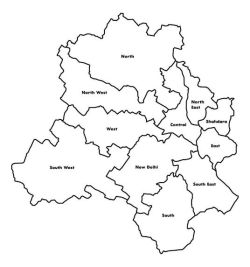Delhi: Difference between revisions
No edit summary |
|||
| Line 37: | Line 37: | ||
Delhi has a unique status: | Delhi has a unique status: | ||
* It functions both as a union territory and has its own legislative assembly. | * It functions both as a union territory and has its own legislative assembly. | ||
* The | * The Lieutenant Governor represents the central government. | ||
* The '''Chief Minister of Delhi''' leads the elected state government. | * The '''Chief Minister of Delhi''' leads the elected state government. | ||
| Line 48: | Line 48: | ||
== Culture and Tourism == | == Culture and Tourism == | ||
Delhi is renowned for its monuments, festivals, and cuisine: | Delhi is renowned for its monuments, festivals, and cuisine: | ||
* UNESCO World Heritage Sites: | * UNESCO World Heritage Sites: Qutub Minar, Humayun’s Tomb, Red Fort | ||
* Religious sites: | * Religious sites: Jama Masjid, Lotus Temple, Akshardham | ||
* Popular markets: | * Popular markets: Chandni Chowk, Connaught Place | ||
== Education and Institutions == | == Education and Institutions == | ||
| Line 72: | Line 72: | ||
== See Also == | == See Also == | ||
* [[New Delhi]] | * [[New Delhi]] | ||
* | * Capital of India | ||
* | * Red Fort | ||
* | * Indian Parliament | ||
* | * Delhi Metro | ||
== References == | == References == | ||
Revision as of 09:59, 26 July 2025

| |
| Map showing the location of Delhi | |
| Capital | New Delhi |
|---|---|
| Largest city | Delhi |
| Official languages | Hindi, English |
| Area | 1,484 km² |
| Population | 16,787,941 (2011) |
| Established | 1 February 1992 |
| Time zone | IST (UTC+05:30) |
| Vehicle code | DL |
| Website | Official site |
Delhi is the capital territory of India, encompassing the city of New Delhi, which serves as the seat of all three branches of the Government of India. Located in northern India, Delhi is a major political, cultural, and historical center of the country.[1]
History
Delhi has been continuously inhabited since the 6th century BCE and has served as a capital to several empires, including:
- The Delhi Sultanate
- The Mughal Empire
- The British Raj (as capital from 1911)
In 1947, Delhi became the capital of independent India.[2]
Geography and Administration
- Delhi borders Haryana and Uttar Pradesh.
- It is officially known as the National Capital Territory of Delhi (NCT).
- The territory includes New Delhi, Old Delhi, and other urban districts.
Government and Politics
Delhi has a unique status:
- It functions both as a union territory and has its own legislative assembly.
- The Lieutenant Governor represents the central government.
- The Chief Minister of Delhi leads the elected state government.
Economy and Infrastructure
Delhi is a major commercial hub with a diverse economy:
- Key industries: IT, telecom, banking, tourism
- Features a robust metro rail system, airports, and highways
- Houses important institutions like the Supreme Court of India, Rashtrapati Bhavan, and Parliament House
Culture and Tourism
Delhi is renowned for its monuments, festivals, and cuisine:
- UNESCO World Heritage Sites: Qutub Minar, Humayun’s Tomb, Red Fort
- Religious sites: Jama Masjid, Lotus Temple, Akshardham
- Popular markets: Chandni Chowk, Connaught Place
Education and Institutions
Home to premier institutions such as:
Climate
Delhi experiences an extreme climate:
- Hot summers (April–June)
- Monsoon (July–September)
- Cold winters (December–January)
Challenges
Delhi faces several urban challenges:
- Air pollution
- Water scarcity
- Traffic congestion
See Also
- New Delhi
- Capital of India
- Red Fort
- Indian Parliament
- Delhi Metro
References
- Articles needing expansion
- Articles needing more references
- National Capital Territory of India
- Delhi
- Capitals of India
- Cities in India
- Metropolitan cities in India
- Tourism in Delhi
- History of Delhi
- Geography of Delhi
- Economy of Delhi
- Government of Delhi
- Education in Delhi
- Culture of Delhi
- States and territories of India

